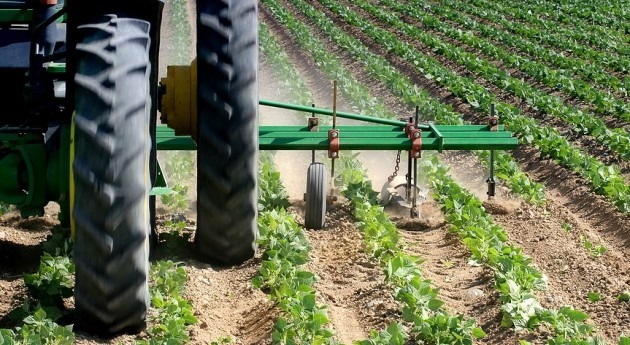Farmers around the world will be offered further support to help them adopt sustainable climate-resilient ways of working thanks to a new scaled-up partnership between the UK and the World Bank under the Just Rural Transition Support Programme, announced at the COP28 climate conference in December.
While we need agriculture to ensure food security and rural livelihoods all over the world, the industry is also one of the biggest drivers of climate change and nature loss. Those farmers in regions being particularly affected by climate change will see more frequent and severe extreme weather events, including flooding and drought.
In Zambia, for example, drought is being driven by climate change and deforestation, which could have a negative impact on local economies and food production.
But this new programme will be able to help smallholders in the country expand their businesses by improving produce quality, growing new crops, linking them to export markets and planting trees to deliver sustainably sourced raw materials.
The scheme will also work alongside climate vulnerable partner countries to help improve soil health and land management, as well as focusing on more efficient use of fertiliser, helping to make agricultural policies more productive and sustainable.
Furthermore, the UK is also poised to provide £10 million in funding through the UN’s Food and Agriculture Organisation to support smallholders and help them improve their incomes while reducing their environmental impact, with particular emphasis placed on forests.
What about water?
However, it’s important to consider water resources when looking at agriculture and food production, with the industry responsible for 70 per cent of all freshwater usage around the world, as well as causing 70 per cent of the world’s water pollution.
As the water crisis deepens over time, it will become increasingly important to take urgent action to deliver sustainable access to clean water for all.
It’s estimated that by 2030 there will be a 40 per cent deficit in freshwater supplies, which poses serious consequences for both people and the planet, with all 26 of the Sustainable Development Goals being put at risk by climate change-driven water insecurity.
To help address this issue, £39 million in new funding for the Just Transitions for Water Security programme was unveiled at the climate summit by Andrew Mitchell, the UK’s international development and Africa minister, with the aim being to help support more effective water management for the future.
Mr Mitchell said: “Water is at the centre of the climate crisis. Water security must be driven up the global agenda.
“My message is clear: we must protect water properly if we are to ensure equitable access for all. UK funding set out today will support water resilient supply chains, and boost investments to ensure this basic and vital source of life is available to vulnerable communities on the frontline of climate change.”
The water security programme will provide low income and climate vulnerable countries with technical assistance to improve management of water resources, which will make them more climate resilient and support more sustainable food systems, while improving flood and drought management, and ensuring access to clean water for all.
Support will also be given to help countries become more water secure, while mobilising essential investment in infrastructure like large-scale rainwater harvesting.
Investment
The scheme will also involve WaterAid’s Resilient Water Accelerator, which strives to boost investment in water systems and help the most climate vulnerable countries in the world, which are among the poorest to be found.
Currently, they don’t receive the financial support they need to make essential investments in resilient water infrastructure and services. Just five per cent of total global climate finance flows goes towards helping communities and businesses adapt, with water programmes receiving less than three per cent of all tracked climate finance around the world.
Furthermore, approximately one per cent of public international climate investment currently goes on protecting basic water services in poor communities, despite the fact that the impacts of climate change are felt predominantly through water.
WaterAid is quick to stress, however, that increasing funding by itself won’t be sufficient to solve the problem and it’s equally important that conditions are enabled to make sure money goes where it’s most needed.
To achieve this, barriers to building robust climate-resilient water initiatives will need to be broken down, such as a lack of localised data, a lack of comprehensive cross-sector approaches to systemic water issues and complex funding landscapes.
This is where the Resilient Water Accelerator comes into its own, a collaboration between WaterAid and the Sustainable Markets Initiative, which brings together the private sector, governments, aid agencies, development banks, climate experts and civil society organisations to build a programme pipeline and support 50 million vulnerable people living in areas facing water stress within ten years.
Tim Wainwright, chief executive of WaterAid, said: “The climate crisis is a water crisis, with communities in low and middle income countries struggling daily with too little, too much, or too dirty water.
“WaterAid welcomes the UK government connecting the drops between climate change and water, committing at COP28 to invest up to £39 million into global water security.
“WaterAid is happy to be supporting the Resilient Water Accelerator in unlocking private investment at pace. We hope other nations will join the UK in supporting adaptation projects that will build life-saving sustainable, climate-resilient water resources and services.”
It’s expected that the Accelerator will deliver comprehensive programmes that target critical risks to water systems and ensure environmental gains like carbon reduction to help encourage diverse finance sources.
It will also help to drive confidence in replicating investments at scale through data availability and acquisition, proof of concept and improved capacity across communities, financial organisations and governments.








